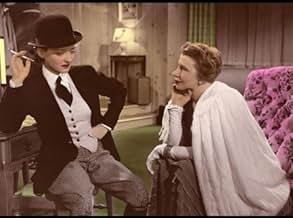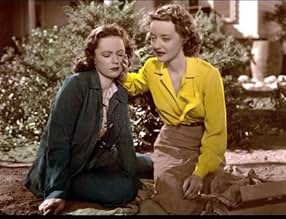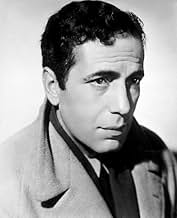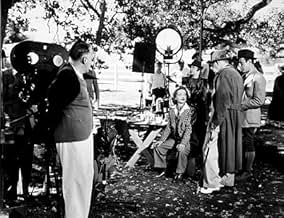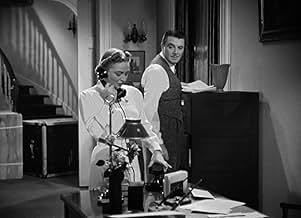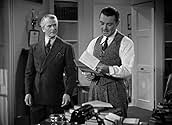AVALIAÇÃO DA IMDb
7,4/10
13 mil
SUA AVALIAÇÃO
Uma jovem socialite é diagnosticada com um tumor cerebral inoperável, e deve decidir se viverá ou não seus últimos dias com dignidade.Uma jovem socialite é diagnosticada com um tumor cerebral inoperável, e deve decidir se viverá ou não seus últimos dias com dignidade.Uma jovem socialite é diagnosticada com um tumor cerebral inoperável, e deve decidir se viverá ou não seus últimos dias com dignidade.
- Direção
- Roteiristas
- Artistas
- Indicado a 3 Oscars
- 5 vitórias e 4 indicações no total
Black Ace
- Judith's Horse
- (não creditado)
Marian Alden
- Judith's Friend
- (não creditado)
Wilda Bennett
- Judith's Friend
- (não creditado)
Diane Bernard
- Lucy - a Servant
- (não creditado)
- Direção
- Roteiristas
- Elenco e equipe completos
- Produção, bilheteria e muito mais no IMDbPro
Avaliações em destaque
"Dark Victory" features a superb performance by Bette Davis, portraying Judy Traherne, a socialite struggling to come to terms with terminal brain cancer, a diagnosis that ironically brings her the greatest joy of her life, as she falls in love with and marries the doctor who diagnosed her, also superbly played by George Brent.
There's nothing really to dislike in this movie. The basic point is simple to figure out: whatever darkness you may face, make the best of it and live life to the fullest, because even in darkness there may be victory. The supporting cast is tremendous, particularly Geraldine Fitzgerald as Ann King, Judy's friend and assistant who helps her through this bewildering time of conflicting emotions. The movie is not exactly filled with suspense and there's no dramatic death scene, but the emotion is raw all the way through, and the sympathy the viewer feels for this couple who are so much in love but have so little time to enjoy it is very real.
This is very well done, and well worth a look see. I would rate it as a 7/10.
There's nothing really to dislike in this movie. The basic point is simple to figure out: whatever darkness you may face, make the best of it and live life to the fullest, because even in darkness there may be victory. The supporting cast is tremendous, particularly Geraldine Fitzgerald as Ann King, Judy's friend and assistant who helps her through this bewildering time of conflicting emotions. The movie is not exactly filled with suspense and there's no dramatic death scene, but the emotion is raw all the way through, and the sympathy the viewer feels for this couple who are so much in love but have so little time to enjoy it is very real.
This is very well done, and well worth a look see. I would rate it as a 7/10.
There are three central performances in DARK VICTORY that deserve praise for their sincerity and complete believability--BETTE DAVIS as the spoiled heiress, GEORGE BRENT as the doctor who falls in love with her and GERALDINE FITZGERALD as the conscience of the story, feeling pity and love for her dearest friend.
Davis trounces around through the first half to show us what kind of energy and volatility is flaring beneath the surface--so full of life that when she realizes her illness bears the stamp of "prognosis negative", it's a shock to the audience as well as the actress. She's at her level best in all of the quieter moments--and never more impressive than in the final ten minutes of the film where her character must face the impending death with dignity and the knowledge that she has her husband's love and her best friend's devotion.
The scene in the garden with Fitzgerald at her side is the most luminous in the entire film. It's worth waiting for just to watch two great actresses at work.
Max Steiner's score is fitting at all times--even in the final moments when Bette goes up the stairs accompanied by his melancholy main theme. Edmund Goulding gets sensitive work from his entire cast--with the exception of Ronald Reagan who is given absolutely nothing in the way of character development except to look tipsy in every scene. To say that he is wasted is an understatement. So too is Henry Travers as the doctor who brought Davis into the world. Humphrey Bogart has been criticized for his Irish accent, but he's at least acceptable in a minor role as a horse trainer.
But the three central performances are what hold the film together--and make what is essentially a sob story work so beautifully.
Trivia: George Brent is very effective in the doctor role that was first offered to Basil Rathbone, but then withdrew after a very bad screen test in the part convinced the studio (and Rathbone) that he was all wrong for the role.
Davis trounces around through the first half to show us what kind of energy and volatility is flaring beneath the surface--so full of life that when she realizes her illness bears the stamp of "prognosis negative", it's a shock to the audience as well as the actress. She's at her level best in all of the quieter moments--and never more impressive than in the final ten minutes of the film where her character must face the impending death with dignity and the knowledge that she has her husband's love and her best friend's devotion.
The scene in the garden with Fitzgerald at her side is the most luminous in the entire film. It's worth waiting for just to watch two great actresses at work.
Max Steiner's score is fitting at all times--even in the final moments when Bette goes up the stairs accompanied by his melancholy main theme. Edmund Goulding gets sensitive work from his entire cast--with the exception of Ronald Reagan who is given absolutely nothing in the way of character development except to look tipsy in every scene. To say that he is wasted is an understatement. So too is Henry Travers as the doctor who brought Davis into the world. Humphrey Bogart has been criticized for his Irish accent, but he's at least acceptable in a minor role as a horse trainer.
But the three central performances are what hold the film together--and make what is essentially a sob story work so beautifully.
Trivia: George Brent is very effective in the doctor role that was first offered to Basil Rathbone, but then withdrew after a very bad screen test in the part convinced the studio (and Rathbone) that he was all wrong for the role.
Judith is a wealthy Long Island society girl given to a dizzy lifestyle
Self-assured of her affluence and her faculty over men, she is unprepared for tragedy, which strikes in the form of a brain tumor
The underlying bravery and courage with which she faces this physical suffering eventually demonstrates the woman of substance that she is
Among her friends is Ann King (Fitzgerald), her secretary, and handsome young Alex Hamm (Reagan), who directs her toward brain specialist Dr. Frederick Steele (Brent). The doctor diagnoses her illness as one which will end her life within a year Judith falls in love with him and accepts his proposal of marriage When she discovers that her tumor is calamitous, she rejects the doctor's proposal considering it an act with compassion
Davis provides scene after scene with the special magic only she was able of bringing vividly
Swept into the current of events was Bogart playing an Irish horse trainer, who fails in an attempt to make love to her, yet encourages her to enjoy her time with her true love, George Brent
The film was remade in 1963 as "Stolen Hours" with Susan Hayward, and as a 1976 TV movie under its original title with Elizabeth Montgomery
Among her friends is Ann King (Fitzgerald), her secretary, and handsome young Alex Hamm (Reagan), who directs her toward brain specialist Dr. Frederick Steele (Brent). The doctor diagnoses her illness as one which will end her life within a year Judith falls in love with him and accepts his proposal of marriage When she discovers that her tumor is calamitous, she rejects the doctor's proposal considering it an act with compassion
Davis provides scene after scene with the special magic only she was able of bringing vividly
Swept into the current of events was Bogart playing an Irish horse trainer, who fails in an attempt to make love to her, yet encourages her to enjoy her time with her true love, George Brent
The film was remade in 1963 as "Stolen Hours" with Susan Hayward, and as a 1976 TV movie under its original title with Elizabeth Montgomery
This is definitely a tear-jerker involving a young socialite Judith Traherne, (Betty Davis) who is full of life and an only child who gets her own way all the time, but is well liked by everyone. Judith loves horses and enjoys riding them and performing with them in various horse shows. The trainer of these horses is Michael O'Leary, (Humphrey Bogart) who loves his work and likes Judith because of her love for animals. One day Judith is riding her horse and her vision becomes blurred and she sees double and falls off the horse. It seems Judy is having bad headaches but does not mention it to anyone and her own doctor refers her to a Dr. Frederick Steele, (George Brent) who is a brain surgeon. Ronald Reagan appears in this film as a playboy drunk who is always drinking. Great performance by all the actors, but bring the tissue box, you will need it.
It's easy to see why Bette Davis admired "Dark Victory" more so than any of her other star-vehicles--her Judith Traherne is the quintessential Bette Davis character: smart, sassy, nervously gay, a drinking pal to the guys and a best buddy to the girls. Traherne is without malice, a real chum, and Davis plays her with fluttery vitriol and upper-crust glee. Long Island society girl, ailing but still strong, falls wildly in love with her doctor...but how can he tell her that she has very little time left to live? The supporting cast is made up of some odd personalities: Geraldine Fitzgerald's dedicated girlfriend seems to have no life outside of Judith's world (and performs her gal-pal duties with a curious severity); Humphrey Bogart is an Irish stable-hand with a secret crush on Judith (she's tempted, but ultimately conveys to him the old 'don't touch' message); Ronald Reagan is a country club type, always in a tuxedo and at the bar; George Brent is the brilliant surgeon who loves Judith (but he's faster with his fists than he is with words). Based on a play by George Emerson Brewer, Jr. and Bertram Bloch (which had starred Tallulah Bankhead), this chatty Warner Bros. weeper is glossy and flossy, a dithering, overstated, swooning romantic mini-epic for masochists. In other words, the archetypal Bette Davis film. *** from ****
Você sabia?
- CuriosidadesOff-screen, Bette Davis suffered a nervous breakdown during filming as a result of her crumbling marriage to Harmon Nelson. Reportedly, producer Hal B. Wallis convinced Davis that she could benefit by using these real-life emotions of pain and loss to enhance the portrayal of her character. Meanwhile, Davis's marital problems didn't prevent her from embarking on an affair with co-star George Brent. Davis and Brent appeared in a total of 11 movies together.
- Erros de gravaçãoWhen the setting changes to Vermont towards the end of the film, there is snow on the ground and it is obviously winter. Yet most of the trees in front of the house still have leaves on them.
- Versões alternativasAlso available in computer-coloured version.
- ConexõesFeatured in Stars on Horseback (1943)
- Trilhas sonorasOH, GIVE ME TIME FOR TENDERNESS
(1939) (uncredited)
Music by Edmund Goulding
Lyrics by Elsie Janis
Sung by Vera Van
Principais escolhas
Faça login para avaliar e ver a lista de recomendações personalizadas
Detalhes
Bilheteria
- Faturamento bruto mundial
- US$ 345
- Tempo de duração
- 1 hora e 44 minutos
- Cor
- Mixagem de som
- Proporção
- 1.37 : 1
Contribua para esta página
Sugerir uma alteração ou adicionar conteúdo ausente


